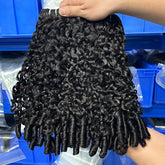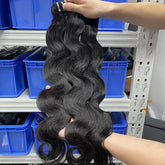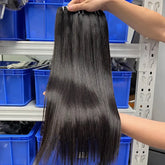Profiting from Sustainable Hair Supply Chains: 2025 Market Trends
In the ever-evolving world of hair extensions and wigs, staying ahead of market trends is key to success. As the global demand for black hair products continues to rise, the importance of sustainable supply chains is more critical than ever. By focusing on sustainability, businesses within the black hair extension and wig industry can not only boost profitability but also contribute to a healthier planet and a more ethical marketplace.
In this blog post, we’ll explore the 2025 market trends for hair supply chains, diving into data-driven insights and actionable tips that wholesalers, retailers, and hairstylists can leverage to stay competitive and profit from sustainable practices.
The Growing Demand for Black Hair Products
The global hair extension and wig market has seen consistent growth, especially within the African American community. As of 2024, the global hair extension market is valued at approximately $6 billion and is projected to grow at a compound annual growth rate (CAGR) of 7.4% through 2027. Within this, the black hair extension market is a significant contributor, driven by the increasing number of individuals embracing protective hairstyles and natural textures.
Consumers are becoming more educated about the sourcing and quality of hair products, with a strong emphasis on ethical practices and sustainability. This shift is influencing buying behavior, making sustainability not just a trend but a necessity for future growth in the black hair market.
2025 Market Trends in Hair Supply Chains
1. Sustainability is Key
With environmental concerns gaining global attention, sustainable hair supply chains are no longer optional; they’re essential. According to a 2023 report by Grand View Research, 52% of consumers are now willing to pay a premium for products made with sustainable and ethical practices. In 2025, sustainability will take center stage, and businesses that prioritize eco-friendly sourcing and production will attract a larger, more conscious customer base.
- Sustainable Sourcing: Hair suppliers will increasingly turn to sustainable sourcing practices, ensuring that hair is ethically collected. This involves creating transparent supply chains where customers know where their hair comes from and how it’s sourced.
- Eco-friendly Packaging: Retailers and wholesalers will adopt recyclable or biodegradable packaging to reduce their environmental footprint.
2. Advancements in Hair Processing Technology
In 2025, advances in processing technology will allow businesses to deliver higher-quality hair at more competitive prices. New technologies will streamline hair treatment processes, improve longevity, and reduce waste.
- Bio-degradable Coatings: The use of biodegradable coatings on hair extensions and wigs will reduce the environmental impact of hair processing.
- Improved Durability: Longer-lasting hair products will reduce the frequency of repurchases, leading to more satisfied customers and less waste overall.
3. Consumer Preference for Customization
In 2025, customization will dominate the black hair extension market. Consumers will seek more personalized products that cater to their unique hair textures, color preferences, and styling needs. Wholesalers and retailers who offer customizable options, such as color matching, will see increased sales and customer loyalty.
- Tailored Hair Products: Retailers and wholesalers should invest in offering customization options, allowing clients to select specific shades, textures, and lengths to suit their individual needs.
- Virtual Try-Ons: Advances in augmented reality (AR) technology will enable online shoppers to visualize hair extensions and wigs before purchasing.
4. Rise of Direct-to-Consumer (D2C) Sales
The direct-to-consumer model will continue to rise in 2025, with more businesses bypassing traditional distribution channels to sell directly to consumers via e-commerce platforms. This trend is fueled by the growing number of online shoppers, particularly within the black hair industry, where many individuals prefer the convenience of online shopping and the ability to research products before purchase.
- E-commerce Optimization: Wholesalers and retailers must optimize their online presence, offering detailed product descriptions, reviews, and professional advice to build trust and loyalty with customers.
- Subscription Services: D2C businesses will increasingly offer subscription services, providing consumers with regular deliveries of their favorite products, ensuring convenience and consistent revenue for companies.
5. Supply Chain Transparency and Ethical Practices
Consumers today are more informed and selective about where their products come from. They want to know how the hair is sourced and processed. This demand for transparency will continue to grow in 2025, with businesses needing to clearly communicate their sourcing methods, labor practices, and environmental policies.
- Traceability Tools: Businesses will need to implement tools that allow consumers to trace the journey of their hair from source to product, ensuring full transparency.
- Fair Trade Certifications: Companies that can secure fair trade certifications or ethical sourcing labels will have a competitive edge in the marketplace.
Actionable Tips for Wholesalers, Retailers, and Hairstylists
- Invest in Sustainable Products: Partner with suppliers who focus on eco-friendly sourcing, biodegradable packaging, and non-toxic processing methods. These suppliers are increasingly in demand and will help differentiate your offerings in the marketplace.
- Leverage Technology: Embrace new technologies such as augmented reality for virtual try-ons and improved hair processing techniques to enhance product quality and customer experience.
- Offer Customization: Focus on catering to the specific needs of your customers. Providing customized products such as personalized hair colors, textures, and lengths will help build brand loyalty.
- Embrace Direct-to-Consumer Models: If you’re a wholesaler or retailer, consider expanding your business into e-commerce. The convenience of online shopping is highly appealing, especially when paired with subscription services for regular customers.
- Build Trust with Transparency: Focus on building trust by being transparent about your sourcing and production processes. Ethical sourcing and clear communication can boost your brand’s reputation and attract more conscious consumers.
Key Takeaways
- Sustainability will be a driving force in the black hair extension and wig market in 2025, with consumers increasingly prioritizing eco-friendly and ethical products.
- Customization and direct-to-consumer models will continue to rise, with customers seeking more personalized and convenient shopping experiences.
- Technological advancements in hair processing and e-commerce platforms will enable businesses to offer higher-quality products and improve customer satisfaction.
- Transparency and ethical practices will be essential for businesses looking to build trust and remain competitive in a rapidly evolving market.
As we move into 2025, businesses that embrace sustainability and innovation within their hair supply chains will be well-positioned to meet the demands of the modern consumer and profit from the evolving trends in the black hair market.







